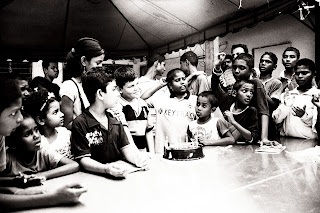“My daughter has an insatiable need for attention, I literally cannot look away for 2 minutes without her freaking out…”
“My youngest is SO controlling. Demanding siblings sit in specific places, insisting on turning on or off lights, having to go down or up stairs first or completely melting down if the sandwich is cut the wrong way…”
“My son’s behaviour is starting to scare me. I found him in his closet playing with a lighter the other day, and he’s picked up the kitten and thrown it more than once…”
Years ago, I was leading a discussion group about high-needs
children, and how for them quite often ‘winning’ the argument isn’t a matter of
being on top or besting others, but of quite literally being themselves. For
them, they aren’t arguing to win, but to be allowed to be who they are, to feel
as they feel. This is why the intensity is so high, and they will go to the mat
for what seems like the tiniest of things.
During the session, we started talking about William
Glasser’s Five Basic Needs, which I think are very similar to Maslow’s
Hierarchy of Needs, but more useable in parenting. Maslow thinks everything is
foundation for everything above, starting with basic physical needs and ending
up on top with the need to be oneself, using gifts and knowledge and talent
toward personal goals (even if those personal goals are ’save the world.’) I
think he’s right about that.
Glasser’s I find more useful, when talking about handling
kids and understanding their sometimes terrifyingly weird behaviour. His go
like this:
- Physical needs (food, sleep, water, sunlight, for older people: sex, physical safety and a sense of security
- Love and a sense of belonging (this is where attention fits)
- Power
- Freedom and
- Fun
 This is when I had a surprising insight: when someone is eating
relentlessly regardless of hunger, they are not meeting their needs for hunger
… nor whatever else it is they need that they are trying to ‘feed’ in substitution.
This is when I had a surprising insight: when someone is eating
relentlessly regardless of hunger, they are not meeting their needs for hunger
… nor whatever else it is they need that they are trying to ‘feed’ in substitution.
In Lazy Parenting,
I refer to compensation as this:
Getting what you don’t need, to make up for not getting what you do need.
The higher up the list the insatiable need seems to be, the
lower down the list it needs to be addressed. That is: it is insatiable because
it isn’t the real need.
The real need is a lower number.
When people give up feeling secure or safe enough, they
essentially say to the universe,
“Fine! I will concede that I will never get that thing I need, so instead I will take all of the attention / power / freedom / fun there is…”
usually working up the list
from one to the other, as they discover that attention doesn’t fix it, then
power doesn’t fix it, then freedom doesn’t fix it, so they’ll just have fun.
Cue lighting the car on fire, to see the pretty colours as it burns.
It is extremely
common for people in our society to have unmet needs for security. Even adults
struggle for a sense of inner balance and security, considering the delivery of
24/7 bad news to every form of media and technology there is, from tv to your
smartwatch, and very real dangers of being savaged by an online riot, attacked in
the street without warning, or even just witnessing a distressingly close car
accident.
Imagine what it’s like for little kids…
For me, the solution is simple –basic, really—but that is
not to say it is easy to accomplish
Help the child feel safe.
…which is in some ways about what helps humans feel secure,
instinctively … and in other ways about individual preferences and ‘love
languages.’ Some kids will feel secure with the most physical assistance: a
nightlight, a cozy nest with a low ceiling and a view of anything approaching.
Some kids feel safe being close to their people, those they
really trust, whether that is the au pair they grew up with, their parents,
grandparents or even familiar neighbours they’ve known for years.
Some kids feel safe in wide open spaces, without walls for
the noises to bounce of and free of ‘the maddening crowd.’ Some feel safer in
forests that potentially have more instinctive dangers than any playground holds,
but their experience is otherwise. Some feel safe floating in water and others
panic in anything deeper than their ankles or bigger than a small stream.
Knowing the child, and what their own fears are can help in
avoiding accidentally making them feel even more frightened and unsure –pushing
a child afraid of heights onto a bunk bed made like a lookout / nest is likely
to make things worse, whereas making a nest in the bottom of a closet with a
low shelf just above head-level when the child is seated won’t bother a child
with no issues with claustrophobia…
What tends to help people feel safe includes:
- something solid at their back, so tigers can’t sneak up behind them (remember, this is primal, not sensible and modern –our fears don’t know anything at all about locks or about living in cities free of roaming tigers),
- a long view that can see anything coming (tigers, again, I’m afraid…),
- a lighted path toward a lighted space (not bright, necessarily, just not moving from a bright space into a dark one –another primal fear, that may explain some of kids not wanting to go to their dark rooms up the dark stairs to get ready for bed alone…),
- soft, flickering lights (fire in that cave overlooking the valley…),
- soft surfaces and cozy rugs or throws or pillows (furs in those caves …),
- soft music, especially that with a relaxed heartbeat-rate cadence –about 65 beats per minute (reminds us of being in our moms, the last time many people felt really safe and whole, sadly),
- the company of big eyed, softly smiling creatures that are (or seem) warm to touch and snuggly (stuffed animals, Muppets, baby animals in photos or real live puppies),
- an absence of clutter or pressure to do work or many different types of tasks, particularly the kind of static visual clutter that seems to be required for every flat surface in classrooms these days (just because teachers are bored by bare walls, I think),
- natural views –water, particularly, but also forests, fields and streams, big skies, distant mountains, and also soft, cool colours: greens, blues, lavendar,
- and, if it’s ever been an issue of lack or want, food in a variety of colours and shapes and sizes and aromas, even just in photos…
Some ideas I have known parents to provide for their kids:
- A blanket fort under the dining room table, pushed into the corner so the walls are behind, with pillows and stuffies and a soft, battery powered led lights, fairy light strings, or battery-powered ‘candles’.
- Spending time in a lower grade, or program for younger kids –kindergarten kids helping out in the preschool room, 9yos helping kinders read, 12yos helping at the dance studio with the young kids. There is a lot to be said for being among those who have lower expectations, low pressure to conform, and who think you’re cool simply because you’re 3 years older.
- As mentioned, a ‘nest’ on the top bunk, using that low-ceiling feel, especially in a room where the bed can be positioned to look down a long hallway, or across the yard through a window.
- The also-mentioned nest set up in the linen closet at the end of the hall, under a low shelf.
- The Frank Lloyd Wright- style cozy (some call it a snug), with the low ceiling, a fireplace, bookshelves and soft sofas lining the ‘conversation’ area, with a table large enough for food to be laid on by the platter, with cushions and throws to snuggle into.
- The kitchen-as-heart-of-home, arranged with the idea that most activities will take place there where the food is: a big table for meal prep, homework, reading or crafts and places to store whatever’s not being used out of sight (behind doors, inside baskets, around the corner in the hallway or whatever), particularly if that kitchen has a heat source, like an old range, wood stove or fireplace. Even a bank of candles can help with the settled, cozy, safe feeling. The aroma of foods (soups, baking, stew, breads) being made, and help-yourself platters for grazing can add to the feeling of warmth and comfort.
- A lighted pathway from one area of the house to another, which can be helpful for that ‘shutting down the house’ when kids are little and are afraid of missing out on all the fun adult stuff parents may be planning for after bedtime (the kids think, they never imagine it’s laundry and paying bills) –turn the lights on brightly in the bedrooms, dimly in the hallways to get there and dim the lights and then turn them out in the main spaces of the house, so they are naturally drawn to where there is light, and don’t feel they’re going from daylight into gloom and shadows. This, alone, can be amazingly settling, when followed by turning off the hallway lights, and dimming the room lights in increments as the bedtime stuff gets done.
Not mentioned previously are a few psychological and
physiological things that can also help people feel safe:
- Hugs, particularly those that feel really enveloping –the whole arm around over the shoulder and the other from under the arm, really embracing a human to feel firmly but gently cradled in arms,
- Caresses on cheeks, and holding the cheek and jaw or the back of the head gently but firmly, particularly for people who have never had their heads moved to control where they are looking or to demand they make unwanted eye contact,
- Stroking the upper arms, up and down slowly,
- One hand on the chest at heart level and one on the back at the same level, can be very settling,
- Deep breathing, particularly breathing out slowly and evenly through the nose,
- Cooing, low voices, and an absence of intensity and shouting,
- Taking in the 5, in no specific order: finding 5 things to see, 4 things to hear, 3 things to touch, 2 things to taste and 1 thing to smell… to really connect with the immediate experience of the body (particularly helpful for fears of things that are not actually happening, worry and anxiety),
- Gratitude is incompatible with fear, so directing attention toward things one loves, people who love them, and specific blessings in life (of any kind, from being glad there is air to being happy the stars are there to look at…)



![[Becoming.Number.One♥] by A♥ https://www.flickr.com/photos/zenat_el3ain/3182181634/in/photolist-5RcvJA-4sGR5-9aXY3a-6BzSc1-74p3sr-bJowaB-4WyZhn-wzehf-nbt8Sz-6qTsQD-dYoHf5-F7njUp-mnjaKd-bSSZAz-qjdcA5-kUYPsH-cJhJdE-brt87D-eSmRdt-zU3Jg-a7wBxT-kFkb48-5pQH1B-6jVU7o-q7xHC2-7qXVGD-9sXH4h-sqcQh3-5DSn2j-aDVYNK-dRc7Lz-w8Qmnk-4dhB6M-YhkVFr-9uJ91i-5jCYsS-4mgLwZ-LFKPG-suekp-npoUWi-7JTLC-aL66UP-qYDg43-dfoqz3-ec5r74-Curwec-T7KoQW-74dhyN-48x8sq-koUyur first needs, security and safety, attachment parenting, helping kids feel safe, number one concern](https://blogger.googleusercontent.com/img/b/R29vZ2xl/AVvXsEif4DYR0JjsoKw-Ovb8CueG_Cg4xWQtC-rLQMVNfkq376WqumaLa15IKXrXeGfwgFi6iPrAqHL4hnzUb7pR58DQK7uTkpSKRwt05y5wECae311fNsnOON2yNGvOmmXcNKijrNNWSXnIy5Q/s320/3182181634_e6b8a24c60_o.jpg)



















